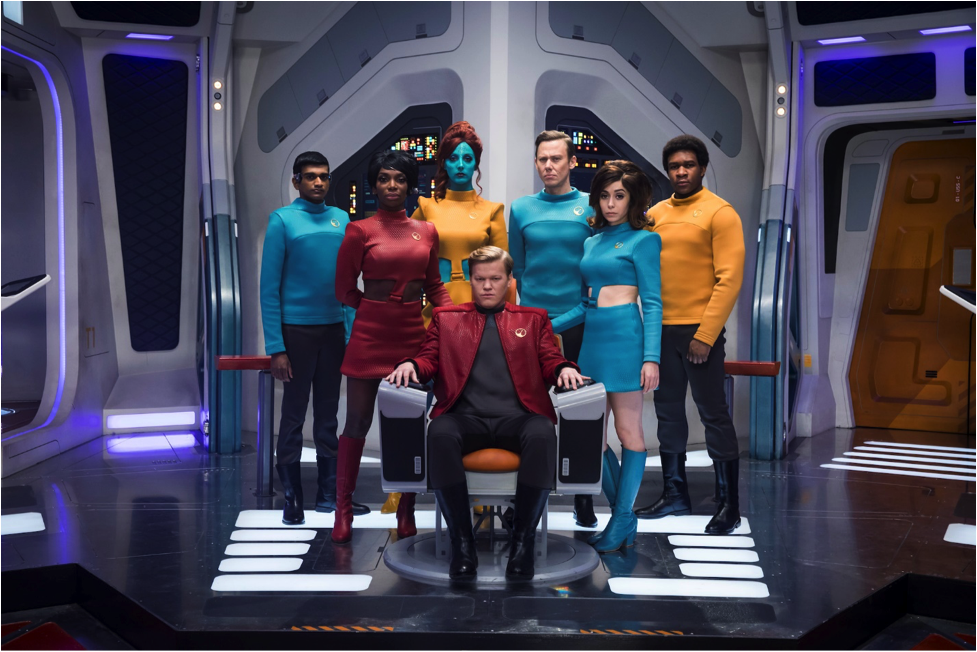By Stephanie Wang
WARNING: the below includes major plot spoilers for season 4 episode 1 of Black Mirror, “USS Callister”
Content note: Sexual violence, control
At first glance, “USS Callister” seemingly features some odd Star Trek-adjacent fantasy of a genius programmer, Robert Daly. And at first, viewers tend to sympathise with him – he’s clearly shy and used to being manipulated and walked all over by his co-workers at the company he co-founded. Despite coming up with the idea and code for the popular virtual reality game, Infinity, he receives little of the credit as the spotlight falls to James Walton, a man much more charismatic and likeable, but with no real knowledge of the technical side of the company.
While all the other workers treat Daly with as little respect as possible, the new hire Nanette treats him with the utmost respect, idolising his code and recognising him as the one who actually coded for Infinity. After being given even the slightest attention, Daly begins to stare at Nanette constantly during work, even eavesdropping on her conversations with other workers – basically, he’s giving off major stalker vibes.
And then, he digs through her trash and obtains a coffee cup and it’s revealed that with this DNA, he’s able to essentially create a digital clone of her. It turns out that this Star Trek-adjacent fantasy is not so fantastical – instead it features cloned copies of co-workers. These individuals still have the same personality and memories of their lives in the real world but are stuck on this ship, USS Callister, for Daly to control in the form of a modded Infinity game that looks like Daly’s favourite TV show.
In this game, he’s the one in charge and the one responsible for keeping peace in the galaxy, tracking down villains. On this ship, Daly can do whatever he’s too scared and timid to do in real life – whether that’s kissing the female members on his ship, choking or otherwise abusing everyone, or turning anyone on the ship who even slightly questions his leadership into a monster.
And it turns out, the smallest thing done in the office could land a worker into his controlling playground – whether it’s “insufficient smiling,” calling him out for “staring” at employees, or bringing him the wrong sandwich.
In these ways, “USS Callister” can be seen as a type of allegory for the abuses of power taken by the men in leadership roles in big tech companies. It’s no secret that in many of the big Silicon Valley companies, there’s a culture of harassment and sexual misconduct that’s often just pushed under the rug by the companies. In many cases, these perpetrators are never brought to justice as there’s either not a human resources department or if there is one, victims are simply told by HR that nothing can be done. And then there’s the threat of unemployment or for their career to be defined as a whistleblower, giving those higher-up the ability to do anything they want without fearing any sort of backlash.
In 2017, several women in tech came forward with their stories about sexual misconduct of those in Silicon Valley, and while companies promised investigations women say that there have been few tangible changes made by those in power. And still, the simple fact remains that the tech industry on the aggregate has done little to none that would systematically support women in an industry dominated by men because there’s “too much power, too much money, and too few reasons to change.”
Robert Daly is the classic “misunderstood, bullied coder” who uses that to justify the actions he takes. This draws similarities to the way Silicon Valley’s big players wouldn’t try harassing women in the “real world,” but feel free to do so in the workplace where they reign as king, unchecked and knowing that there, their actions have no consequences. And of course, this problem isn’t just limited to the tech world – it’s also seen with the dozens of women who’ve stepped out to reveal the awful abuses of power taken by directors in Hollywood as well as the other silence breakers of varying races, income classes, and occupations. It’s a problem that’s unfortunately prevalent in all aspects of society.
While Black Mirror is infamous for sad endings, “USS Callister” ends on a bright, light-hearted note. The happy ending of the episode – namely the prevailing of the digital clones in escaping to a space universe without Daly and his abusive control – is brought by a woman (Nanette) who comes up with the ingenious plan despite being initially underestimated both by the other clones and Daly. And while this episode, like other Black Mirror episodes, does warn watchers of the dangers of technology (it is technology, after all, that allows Daly to create the digital clones and create this warped world), perhaps the even bigger point is to be even more wary of the human players behind the technology – to keep those with access to technology and power in check.
Whether this same happy ending – the ending of a culture of harassment in both Silicon Valley and on the aggregate level – will occur in the modern world remains to be seen. And it seems like a good step is being taken with this anti-harassment action plan signed by 300 prominent women in Hollywood.
This post was brought to you in collaboration with Powered By Girl
